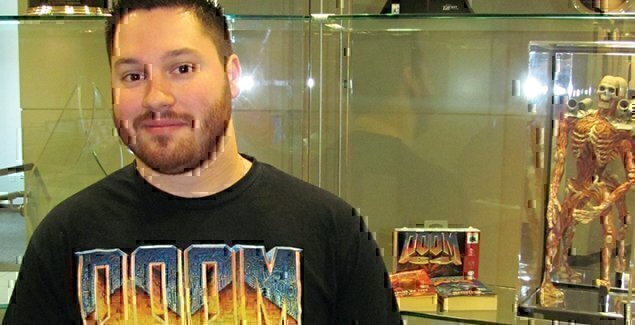Game on!
There’s an infinite number of career paths for America’s young veterans in entertainment. Navy veteran Mark A. Diaz, 27, landed his dream job in March 2014 developing video games for id Software, which produced such popular titles as Wolfenstein, Doom and Quake.
“I only worked on it for a couple months beforehand, but when we revealed Doom at Quakecon last year the feeling I got seeing our work on screen was amazing,” Diaz says. “Hearing the fans’ reactions is definitely the coolest part of the job to me.”
First, though, Diaz earned a bachelor’s degree in game development from Full Sail University in 2014. We picked Diaz’ brain about his super cool job, and how he got there.
Was this your first job out of the military? My first job out of the military was working as a contractor for the U.S. Army. The pay was awesome, but contract work didn’t provide the job security I wanted, plus I just wasn’t passionate about it. I quit that job after a year to go to school full time for game development.
So what does a video game Developer do?
What do you do at ID? I write and debug C++ code for gameplay systems and graphics within the id Tech engine. I implement robust, scalable solutions that look, feel and act cool and polished using input and assets from designers, producers and artists.
What’s your typical day like? I do my best coding in the morning so I ingest caffeine and jump right into whatever I’m working on. Most days we have a quick team meeting where we communicate if there’s anything blocking progress. The rest of the day is spent coding and working with the team. I try to hit the gym each night, but usually come back to the office to wrap things up.
Why did you choose this career path? I’ve always loved playing video games, and when I was a kid I would code games on my TI-83 calculator. I liked being able to build and escape to another world.
How did you get your job at id? Full Sail’s Game Industry outreach rep Rob Coble always asks students for companies they’re interested in working for. When I said id Software he forwarded my resume to their HR department. I did well on their programming test, had a phone and on-site interview, then was offered the job.
What worked best in your job search? Honestly, showing my passion and enthusiasm for game development by kicking ass at school. Go above and beyond the bare minimum, participate with your classmates, be humble, kind and approachable, and learn your craft. All the networking, resumes, veteran status, strengths and weaknesses don’t mean a thing if you can’t walk the walk.
Did anything about the entertainment industry surprise you? The enormous amount of teamwork and collaboration that goes into making a modern triple-A title is absolutely staggering. There was no way to anticipate the amount of knowledge and work that gets poured in; it’s the largest team effort I’ve ever been a part of.
What hours/days do you typically work? I typically work Monday through Friday. Core hours are from 10 to 4, but I usually work 9 to 8. I love my job, love being around my awesome co-workers, love making video games, so it doesn’t feel like work.
What skills learned in the military do you apply to your job today? My attention to detail and ability to troubleshoot errors. I can assess a bug, logically compartmentalize the potential causes and test for a solution quickly. I’m also an expert marksman with the M9 service pistol and the M16, so if a portal to hell opens in the office, I’m ready.
What’s the biggest challenge? Keeping up with the amount of knowledge required to advance and perform well among such a hyper-intelligent group of people. To do well as a game developer you have to be an information sponge, constantly learning and expanding your skill set.
Best advice for transitioning service members want to learn how to get a job in the video game industry? Focus on being the best at what you do. Work hard, be proud of your service but don’t let it give you a sense of entitlement. Don’t look down on other people. Approach this new career fully aware that you’re the low man on the totem pole again, and then start climbing.
__
5 Hot Jobs in Game Development
Rob Coble worked in the music business for 25 years and the game industry for 10 1/2 years. Today as a member of the Career Development department at Full Sail University he helps young folks get their foot in the door of the entertainment industry. Here are the 5 hottest jobs in gaming, according to Coble:
• Technical Artist
• Technical Designer
• UI programmer
• Mobile Developer
• User Experience Specialist
Coble’s Advice: “Who you know is as important as what you know. Many people add to their education by building their own games or apps on the side. This also provides the experience many studios look for. Networking and marketing your skills is important.”
__
Want to Talk to Diaz? If you have any questions about game development, Full Sail University, or starting over as a veteran in a new career field, Diaz invites you to contact him through twitter @Tenacious_Diaz and follow @FSGameDev @FullSail and @NetworkingNerds
Click the link for other HOT jobs for veterans.
READ NEXT: How to get a job in the video game industry








